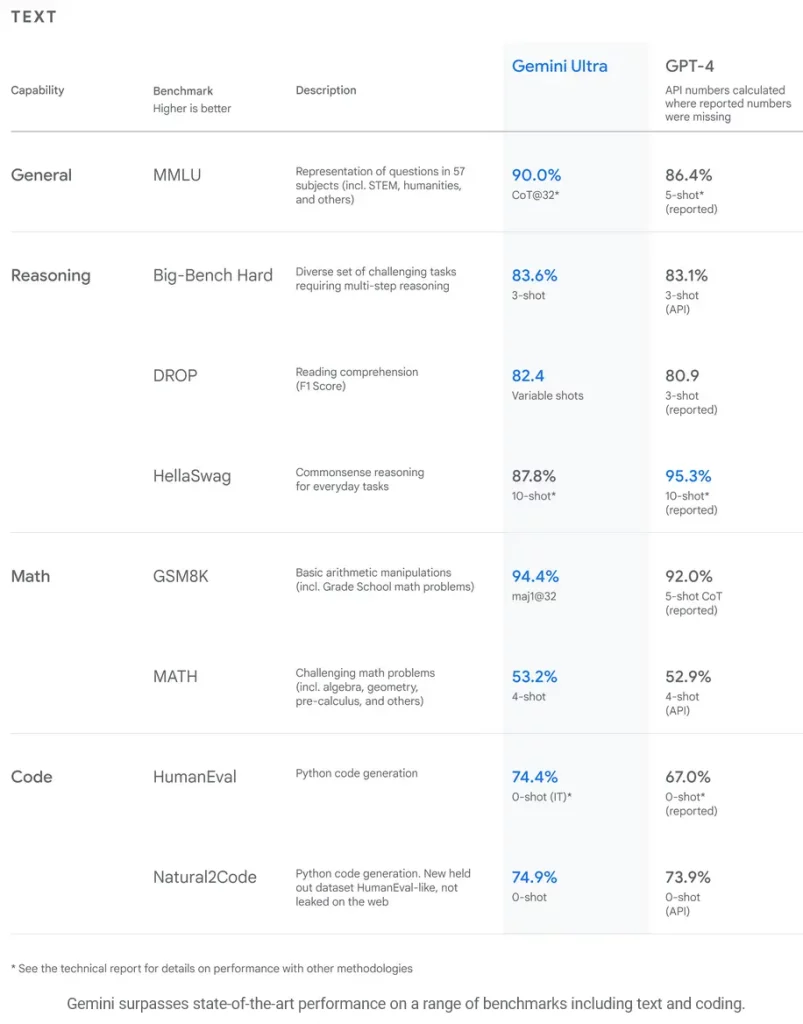
Google has recently rolled out a major update to its AI chatbot, Bard, introducing Gemini, their latest robust large language model. This upgrade is a game-changer, aiming to redefine user interactions with AI by enhancing Bard’s power, adaptability, and intelligence.
This article will delve into the recent announcements, shed light on Gemini’s capabilities, and provide an overview of the anticipated changes brought about by this update.
Gemini represents a monumental stride in AI language modeling. It stands as a highly sophisticated large language model (LLM), trained on an extensive corpus of text and code, surpassing its forerunners across various dimensions. This new model boasts enhanced effectiveness in generating high-quality text, precise language translation, creative content creation, and detailed query responses.
Bard has been steadily progressing to match OpenAI’s GPT models, such as GPT-4, but there has persistently been a noticeable disparity. However, with the arrival of Gemini, it appears that this gap has substantially reduced.
Bard gains prowess with Gemini Pro.
This first phase of the upgrade introduces Gemini Pro, a finely tuned model crafted for extensive use in large-scale applications. It showcases exceptional performance in tasks like text summarization, question answering, and code generation, seamlessly integrating with Bard’s current capabilities.
Introducing the New “Double-check Response” Feature.
In a bid to bolster user confidence in Bard’s replies, Google unveils the latest feature, “Double-check response.” This functionality allows users to validate the accuracy and reliability of Bard’s answers by cross-referencing them with external information sources.
Upon selecting the “Double-check response” button, Bard assesses its reply and highlights statements that align with or differ from data sourced from the web. Verified facts are marked in green, potentially inaccurate content in a distinct shade of brown. Unhighlighted text signifies instances where Bard couldn’t find sufficient information to assess the statements.
Diverse Content Formats.
While Gemini Pro initially centers on text-based inputs, Google intends to broaden its scope to encompass multimodal content. This expansion means that Bard will eventually grasp and respond to inputs incorporating text, images, and diverse media formats.
Imagine interacting with Bard, seamlessly transitioning between text, images, and even videos. Bard’s capacity to comprehend and engage with this variety of media will offer numerous possibilities and applications.
Bard’s Advancement in 2024.
In 2024, Google will unveil Bard Advanced, a new iteration empowered by Gemini’s most sophisticated model. This upgraded version is anticipated to demonstrate remarkable performance and adaptability, positioning Bard as the foremost AI chatbot in the market.
The comparison between Bard Advanced and OpenAI’s leading GPT during that period promises to be intriguing. Each might exhibit distinct strengths; Google Bard’s advantage might stem from its access to Google’s comprehensive search results, while OpenAI could leverage the synergy of multiple AI agents and models working cohesively.
Gemini’s Influence Across Google’s Spectrum.
The reach of the Gemini upgrade extends beyond Bard, impacting various Google products and devices such as the Google Pixel. This enhancement is poised to refine the search engine, elevate language translation precision, and enrich the quality of content available across the internet.
For further insights on Gemini, refer to Google’s original blog post here: [Link to Google’s Gemini blog post].
Gemini undeniably marks an advancement from Bard’s previous model, promising significantly improved responses for regular users. When compared to ChatGPT, Bard now demonstrates comparable or even superior outcomes, particularly when provided with ample information. The addition of the double-check response feature acts as an AI content validator, enhancing Bard’s utility.
Moreover, one of Bard’s strongest attributes is its accessibility as a free-to-use platform with consistently swift response times. However, users should be aware that utilizing Bard comes with a trade-off – conversations might be reviewed and utilized for training by Google. While this practice is common among AI companies, it’s advisable to exercise caution and refrain from sharing overly sensitive information with Bard, or any AI, for that matter.
